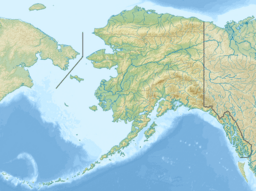Camp 15 Peak facts for kids
Quick facts for kids Camp 15 Peak |
|
|---|---|
| Highest point | |
| Elevation | 5,321 ft (1,622 m) |
| Geography | |
| Location | Juneau, Alaska, United States |
| Parent range | Boundary Ranges |
| Topo map | USGS Juneau C-2 |
Camp 15 Peak is a mountain located in Juneau, Alaska, in the United States. This mountain is part of the Boundary Ranges, which are a large group of mountains within the bigger Coast Mountains of western North America. You can find Camp 15 Peak about 3 miles southwest of another peak called The Tusk. It's also about 28 miles north-northwest of the city of Juneau.
Contents
What is Camp 15 Peak?
Camp 15 Peak stands tall at 5,321 feet (about 1,622 meters) above sea level. It's located on a high ridge of land that sits east of the Battle Glacier. Mountains like Camp 15 Peak are important parts of the natural landscape. They often play a role in local weather patterns and are home to different kinds of plants and animals.
Studying the Juneau Icefield
Camp 15 Peak is close to the Juneau Icefield, which is a huge area covered in ice and glaciers. Scientists are very interested in this area. The Juneau Icefield Research Program (JIRP) is a group that studies the icefield. They have included Camp 15 Peak in their research.
Why do scientists study mountains?
In 2001, the JIRP team surveyed Camp 15 Peak. They were looking at the conditions across parts of the Juneau Icefield. Scientists study mountains and glaciers to understand how our planet is changing. They look at things like how much ice is melting and how the climate is affecting these natural areas. This helps us learn more about Earth's environment.
Naming and Mapping the Peak
The Juneau Icefield Research Program first noted Camp 15 Peak back in 1964. Later, on January 1, 2000, the mountain was officially added to the United States Geological Survey's Geographic Names Information System (GNIS).
What is the Geographic Names Information System?
The GNIS is like a giant dictionary for places in the United States. It's a database that keeps track of all the official names and locations of physical features, like mountains, rivers, and lakes. When a place is added to the GNIS, it means its name and location are officially recognized by the U.S. government. This helps everyone use the same names for places, making maps and information clear.


